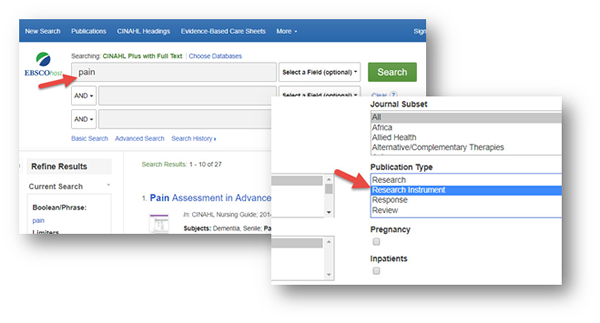Instruments
Instruments, also called assessments or tests, are measurements in empirical studies. Examples include questionnaires, surveys, interview guides, scales, and indexes.
Finding Instruments
Several databases have information about instruments and the instruments themselves. Look for limiters such as Assessments, Tests, Surveys, Indexes, or Questionnaires.
Databases
PsycTESTS
PsycTESTS contains actual tests and information about tests. Search by topic, institution, author or the name of the test. For more info, consult our PsycTESTS guide.
ERIC
ERIC (Educational Resources Information Center) has tests and test reviews. To find actual tests:
- Begin at the Advanced Search
- Under the Publication Type, choose Tests/Questionnaires.
- Add a topic to the first search box. In most cases, the results will have assessments in their appendices.
CINAHL
- Begin at the Advanced Search.
- Add a topic to the first search box.
- Under the Publication Type, choose Research Instrument.

GEM
The Group-Evaluated Measures Database has instruments related to education, health, and work life. Most of the measures are open access.
PsycINFO
PsycINFO has tests and test reviews. Search for copies of tests by entering the term appended in the Tests & Measures field. Add keywords in the next search box.
Test Link
Test Link from Educational Testing Services is a database of unpublished tests that have been submitted by researchers and educators. Most tests are available with a small fee.
Instruments
Ed.D. Instruments
Browse the full list of instruments on-campus at Twin Cities Library for Ed.D. students.
CDC: Adverse Childhood Experiences (ACEs)
The ACEs tests was developed by the CDC and Kaiser Permanente for a study exploring the relationship between childhood experiences and health and wellbeing later in life.
Depression Anxiety Stress Scales (DASS)
DASS is a 42 item questionnaire with scales for depression, anxiety, and stress.
The HABITS Lab at UMBC
The HABITS lab publishes instruments related to substance abuse. Most instruments are open access unless otherwise stated.
Choosing Instruments
You may be able to use an existing instrument for your research, depending on its:
- availability
- reliability and validity
- usage permission (if required)
- cost (if required)
Evaluation Tools
Mental Measurements Yearbook with Tests in Print
Mental Measurements Yearbook provides online reviews on current assessment tests in education, therapy, and psychology. Tests in Print is an index to assessment tests with reviews.
Buros Institute of Mental Measurements Test Reviews Online
Buros Institute of Mental Measurements Test Reviews Online is a great source of reviews of psychological tests.
Requesting Permission
Author of Instrument
You may find an instrument in an article, thesis, or dissertation that was developed by the author but without open access permissions. In this case, you will need to contact the author directly for permission. Many authors will grant permission without a fee. Consult this email template from the Columbia University Libraries.
Commercial Instruments
Commercial instruments are available for purchase. They are most commonly used in institutional settings, such as clinics and schools. These instruments are typically published by testing companies such as Pearson, Psychological Assessment Resources, or GL Assessment. The publisher’s website will have information about permissions and purchase. These instruments tend to be heavily vetted (professionally reviewed).
Open Access Instruments
Open access instruments are openly available for use, although they may have limitations to their use. These instruments should clearly state that they are open access or creative commons. PsycTESTS also has instruments that are available without permission.
Institutional Review Board
Prior to collecting data, research projects involving human subjects must be reviewed and approved by Saint Mary’s Institutional Review Board (IRB).
Designing Instruments
Web Center for Social Research Methods
“The Research Methods Knowledge Base is a comprehensive web-based textbook that addresses all of the topics in a typical introductory undergraduate or graduate course in social research methods. It covers the entire research process including: formulating research questions; sampling (probability and nonprobability); measurement (surveys, scaling, qualitative, unobtrusive); research design (experimental and quasi-experimental); data analysis; and, writing the research paper.”
Books
 |
Basic Psychological Measurement, Research Designs, and Statistics without Math Published date: 2006 |
 |
Designing and Constructing Instruments for Social Research and Evaluation Published: 2007 |
 |
Handbook of Psychological Assessment Published: 2016 |
 |
How to Design and Evaluate Research in Education Published: 2015 |
 |
Social Science Research: Principles, Methods and Practices Published: 2012 |
 |
Published: 2013 |

